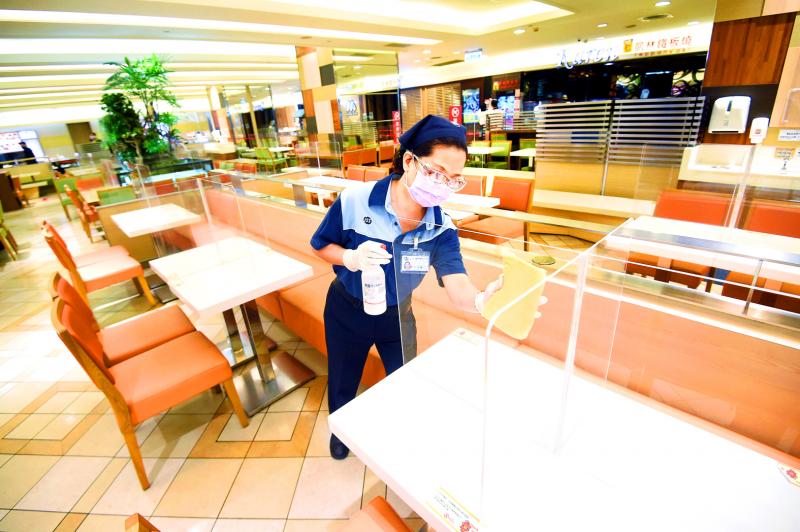Department store and shopping mall operators should accelerate their adoption of new sales models in the face of challenges brought by the COVID-19 outbreak, an expert said on Sunday.
Champion Wang (王建彬), vice president of the think tank Commerce Development Research Institute, said that COVID-19 has fundamentally changed the way department stores and shopping malls operate in Taiwan.
That has been especially true after Taiwan imposed a nationwide level 3 COVID-19 alert on May 19, when case numbers surged. The alert led to restrictions on gatherings, barred on-site dining and prompted government warnings about only going out if necessary.

Photo: Fang Pin-chao, Taipei Times
Retail sales grew 18.3 percent year-on-year in April, but only 2.8 percent in May, government statistics showed.
Moreover, food and beverage sales fell 19.1 percent in May from a year earlier.
Department stores and shopping malls were among the retail spaces hardest hit by the COVID-19 restrictions.
Having shortened their business hours or temporarily closed to contain the spread of the disease after the alert was issued, their sales plunged 28.3 percent year-on-year in May.
The nationwide level 3 alert is provisionally set to last until Monday next week.
Local businesses need to do their best to transition to new sales models to meet the challenges brought by the pandemic, even after the level 3 alert is lifted, Wang said.
One of the major changes needed is for department stores to rearrange their spaces so that customers can maintain social distancing, Wang said.
More importantly, they need to develop their digital channels more quickly, which some leading shopping malls and department stores have been doing for some time, he added.
For instance, Global Mall (環球購物中心), one of the largest chain shopping malls with eight outlets, has been pitching its products online in live-streaming sessions on its Facebook page since last year to reach more potential customers, he said.
It is also planning to work closer with Internet influencers to increase its reach, he said.
Taipei 101 Mall, one of the nation’s top international shopping destinations, is also adapting to the new trend by holding its annual jewelry and watch exhibition virtually for the first time this year, Wang said.
Customers can make appointments online to visit the mall during a specific time frame to be able to shop without having contact with other customers, Taipei 101 Mall said.
Another necessary change is for department stores and malls to reallocate their workforce, especially for food and beverage services, Wang said.
For example, more workers should be allocated to making deliveries as indoor dining is banned, he said, adding that food and beverage businesses should come up with more appealing takeout menus.
Retailers should also speed up their membership marketing, which allows them to send tailored and precisely targeted messages and personalized discounts to boost sales, Wang said.

China’s Huawei Technologies Co (華為) plans to start mass-producing its most advanced artificial intelligence (AI) chip in the first quarter of next year, even as it struggles to make enough chips due to US restrictions, two people familiar with the matter said. The telecoms conglomerate has sent samples of the Ascend 910C — its newest chip, meant to rival those made by US chipmaker Nvidia Corp — to some technology firms and started taking orders, the sources told Reuters. The 910C is being made by top Chinese contract chipmaker Semiconductor Manufacturing International Corp (SMIC, 中芯) on its N+2 process, but a lack

TECH BOOST: New TSMC wafer fabs in Arizona are to dramatically improve US advanced chip production, a report by market research firm TrendForce said With Taiwan Semiconductor Manufacturing Co (TSMC, 台積電) pouring large funds into Arizona, the US is expected to see an improvement in its status to become the second-largest maker of advanced semiconductors in 2027, Taipei-based market researcher TrendForce Corp (集邦科技) said in a report last week. TrendForce estimates the US would account for a 21 percent share in the global advanced integrated circuit (IC) production market by 2027, sharply up from the current 9 percent, as TSMC is investing US$65 billion to build three wafer fabs in Arizona, the report said. TrendForce defined the advanced chipmaking processes as the 7-nanometer process or more

NVIDIA PLATFORM: Hon Hai’s Mexican facility is to begin production early next year and a Taiwan site is to enter production next month, Nvidia wrote on its blog Hon Hai Precision Industry Co (鴻海精密), the world’s biggest electronics manufacturer, yesterday said it is expanding production capacity of artificial intelligence (AI) servers based on Nvidia Corp’s Blackwell chips in Taiwan, the US and Mexico to cope with rising demand. Hon Hai’s new AI-enabled factories are to use Nvidia’s Omnivores platform to create 3D digital twins to plan and simulate automated production lines at a factory in Hsinchu, the company said in a statement. Nvidia’s Omnivores platform is for developing industrial AI simulation applications and helps bring facilities online faster. Hon Hai’s Mexican facility is to begin production early next year and the

Who would not want a social media audience that grows without new content? During the three years she paused production of her short do-it-yourself (DIY) farmer’s lifestyle videos, Chinese vlogger Li Ziqi (李子柒), 34, has seen her YouTube subscribers increase to 20.2 million from about 14 million. While YouTube is banned in China, her fan base there — although not the size of YouTube’s MrBeast, who has 330 million subscribers — is close to 100 million across the country’s social media platforms Douyin (抖音), Sina Weibo (新浪微博) and Xiaohongshu (小紅書). When Li finally released new videos last week — ending what has